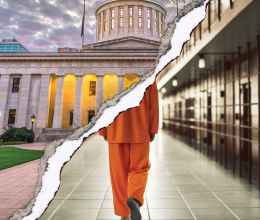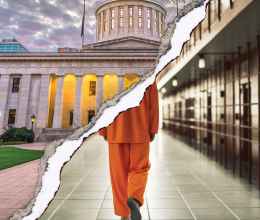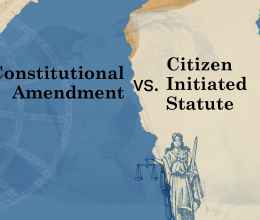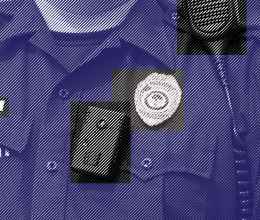Q: What is a grand jury?
ANSWER ↕
A: A grand jury is a jury made up of 9 randomly selected registered voters of the local community, summoned the same way as trial juries. Unlike a trial jury, grand jurors are not screened for bias or other potential issues.
A grand jury hears only the version of events from the prosecutor and her witnesses. After the evidence and testimony is given by the prosecutor and witnesses, the grand jury decides on whether or not to indict the defendant on each charge. At least 7 of the 9 jurors must vote to indict in order for a “bill of indictment” to be issued. Otherwise the grand jury issues a “no bill.”
Grand jury proceedings in Ohio are secret. While an official reporter is present during testimony (but not jury deliberations), the report remains secret unless the court orders the information made public.
Q: Who attends the grand juries?
ANSWER ↕
A: While the prosecutor is presenting their case, the grand jurors, court reporter, prosecutor, and prosecutor’s witnesses are present. Witnesses are only present during their own testimony.
The accused person is not present unless he or she is called as a witness. They do not have a right to have their attorney present even if called as a witness. Not even a judge is present in the grand jury room, although a judge will be contacted if a witness refuses to answer a question and the prosecutor wishes to cite the witness for contempt.
After the conclusion of the prosecutor’s case, the jury deliberates. Grand jury deliberations are completely private, and no one outside of the 9-person grand jury may attend.
Q: What goes on during a grand jury hearing?
ANSWER ↕
A: The prosecutor presents evidence by making her own statements, showing physical evidence, and soliciting testimony of witnesses. The prosecutor may ask the witnesses questions, and members of the grand jury may ask questions throughout the proceeding.
Witnesses are not subject to any cross-examination. The rules of evidence do not apply, so evidence that could not be admitted at trial (e.g. illegally obtained evidence, hearsay) can still be presented to the grand jury for consideration.
Q: What exactly is the grand jury deciding?
ANSWER ↕
A: The grand jury is deciding whether or not to indict a defendant. An indictment is a formal charge/accusation that starts the court proceedings against the defendant.
Basically, the job of the grand jury is to decide: "is there enough credible evidence to charge the defendant with this crime?
It’s important to remember that just because someone is indicted does not mean they are guilty of any crime. The grand jury only considers the prosecution’s version of events, and therefore offers a limited perspective of what actually occurred.
Q: What power does the grand jury have?
ANSWER ↕
A: A grand jury has the power to indict defendants on crimes, usually felonies. The grand jury does not have the power to decide:
- whether or not the prosecutor chooses to move forward with the case after indictment;
- whether or not the defendant is actually convicted; nor,
- the type of punishment that should be imposed on the defendant.
Q: How sure does the grand jury have to be about the person’s guilt?
ANSWER ↕
A: 7 of the 9 member jury must agree to indict the defendant. Basically, jurors must agree that using the information they currently have, do they—as prudent and cautious people-- think that it is probable that this person committed this crime?
Q: What happens after the grand jury?
ANSWER ↕
A: If the grand jury votes against indictment, the case is dismissed for the time being. This does not bar the state from attempting to indict the defendant through a new grand jury later, for example, upon discovering stronger evidence.
An indicted person will be appointed an attorney if they have not already retained one, enter a plea to the charges, and the court will set a bond, if applicable. If a person proceeds to trial, he or she is presumed innocent.
The trial judge or trial jury, which is composed of entirely different people than the grand jury, will ultimately decide whether or not to convict the defendant. That decision will be made only after all of the lawfully admitted evidence from both sides has been heard and it is determined that the accused person is guilty beyond a reasonable doubt.
Q: Why are grand juries used?
ANSWER ↕
A: Grand juries were initially conceived as a way of screening cases before they formally enter the court system. Today, they are used to initiate and, to a limited extent, screen cases to determine which should go forward. The use of grand juries has recently been subject to increased criticism, specifically due to the increased awareness of the non-indictment of police officers who have killed civilians. There are a variety of reasons for skewed grand jury results.
What used to function as a screening process has largely turned into a formality. Many argue that grand juries are outdated.
Q: Is the grand jury process different from state to state?
ANSWER ↕
A: Very. Among states, the use of grand juries varies widely. While all states in the U.S. currently have provisions for grand juries, only about half of the states actually employ them. Only 22 states require their use, to varying extents. In Ohio, felony charges require a grand jury indictment, as do federal charges.
The modern trend is to use a preliminary hearing before a trial court judge, rather than grand jury, which allows both the prosecutor and defense attorney to make their case.
Q: Is the grand jury process different from county to county?
ANSWER ↕
A: Technically no. The rules regarding grand juries are outlined in the Ohio Revised Code, so there are statewide standards. However, each county has its own prosecutor’s office which is in charge of conducting the prosecutions in that county. Therefore, the specific strategies or policies regarding the use of grand juries could potentially vary from county to county.
Q: Why are grand juries held in secret?
ANSWER ↕
A: Grand jury proceedings usually remain secret. Conclusions made by a grand jury are made known by the result: either a bill of indictment, or a "no-bill" if it does not find probable cause. In most jurisdictions, the grand jury proceedings are recorded but not made public.
There are a variety of justifications for this secrecy. One is to ensure the safety of the witnesses and grand jury members. The protection of secrecy allows both members of the grand jury and testifying witnesses the ability to be candid. Another is to avoid tipping off the defendant about the pending investigation against them. A third justification is that secrecy may protect defendants who are not indicted from being subject to slander or speculative accusations.
Many observers critique the secrecy of grand jury proceedings. Critics argue that the secrecy encourages systemic abuses of power by the prosecutor due to a lack of oversight or evidentiary standards.
Q: Are the rights of the accused protected?
ANSWER ↕
A: Grand juries are constitutional, so in the broadest sense, yes. But in effect, the rules of grand juries are clearly for the benefit of the prosecution and encourage law enforcement to use unconstitutional means to get an indictment.
The grand jury process does not encourage constitutional police practices. Information obtained by illegal police investigation, unconstitutional surveillance, or by unreliable means, can be heard and relied upon by grand jurors, even though that information would not be admissible if the case proceeded to trial.
Additionally, even if a prosecutor knows of information that would help show that the accused person is innocent, she is not required to present it to the grand jury. So, while two sides are presented in a trial, only one side will be presented in a grand jury proceeding.
Q: Are grand juries ‘fair?’
ANSWER ↕
A: Grand juries have the potential to be ‘fair’ and the potential to be ‘unfair.’ Perhaps the most unfair part of the grand jury proceedings is that even if a prosecutor knows of information which would help show that the accused person is innocent, she is not required to present it to the grand jury. This could allow a prosecutor to initiate a witch hunt by specifically not presenting important information.
Additionally, no judge and no defense attorney is present during the grand jury proceeding. Absent oversight, grand jury proceedings have the potential to be very unfair.
Many states have abolished the grand jury requirement and allow their prosecutors to initiate felony charges using a preliminary hearing instead of a grand jury.
OTHER RESOURCES ↕
https://campus.udayton.edu/~grandjur/stategj/stateg.htm
https://www.msnbc.com/msnbc/6-your-questions-about-grand-juries-answered
https://www.economist.com/blogs/economist-explains/2014/12/economist-explains-3
https://blog.education.nationalgeographic.com/2014/12/10/grand-juries-101/
https://www.csmonitor.com/USA/Justice/2014/1209/Eric-Garner-case-101-Why-grand-juries-rarely-indict-police-officers-video
https://www.poynter.org/2014/what-journalists-covering-ferguson-need-to-know-about-grand-juries/282359/








